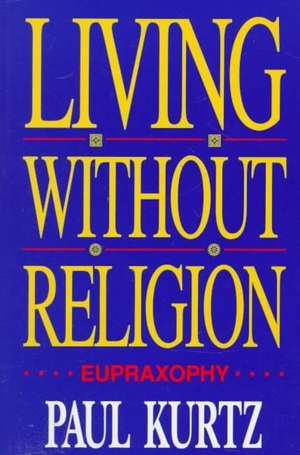Living Without Religion
Autor Paul Kurtzen Limba Engleză Paperback – 31 aug 1994
Eupraxophy draws upon the disciplines of the sciences, philosophy, and ethics - yet it is more than these. Not simply an intellectual position, eupraxophy expresses convictions about the nature of the universe and how to live one's life with commitment and dedication. It thus combines both a cosmic outlook and a life stance. Kurtz maintains that the eupraxopher can lead a meaningful life and help create a just society, and he offers concrete recommendations for the development of the humanism of the future.
An entire section of this book is devoted to the careful definition of religion, which clearly demonstrates than an authentic moral life is possible without religious belief.
Following Kurtz's Transcendental Temptation and Forbidden Fruit, Living without Religion completes a trilogy of humanist works that responds to theistic critics of modern secular humanism.
Preț: 107.40 lei
Nou
Puncte Express: 161
Preț estimativ în valută:
20.55€ • 21.51$ • 17.00£
20.55€ • 21.51$ • 17.00£
Carte disponibilă
Livrare economică 17-31 martie
Preluare comenzi: 021 569.72.76
Specificații
ISBN-13: 9780879759292
ISBN-10: 0879759291
Pagini: 159
Dimensiuni: 154 x 227 x 14 mm
Greutate: 0.25 kg
Ediția:Revised
Editura: Prometheus Books
ISBN-10: 0879759291
Pagini: 159
Dimensiuni: 154 x 227 x 14 mm
Greutate: 0.25 kg
Ediția:Revised
Editura: Prometheus Books
Notă biografică
Paul Kurtz (1925-2012), professor emeritus of philosophy at the State University of New York at Buffalo and a fellow of the American Association for the Advancement of Science, was the author or editor of more than fifty books, including The Transcendental Temptation, The Courage to Become, and Embracing the Power of Humanism, plus nine hundred articles and reviews. He was the founder and chairman of the Center for Inquiry, the Council for Secular Humanism, and the Committee for Skeptical Inquiry. He appeared on many major television and radio talk shows and has lectured at universities worldwide.
